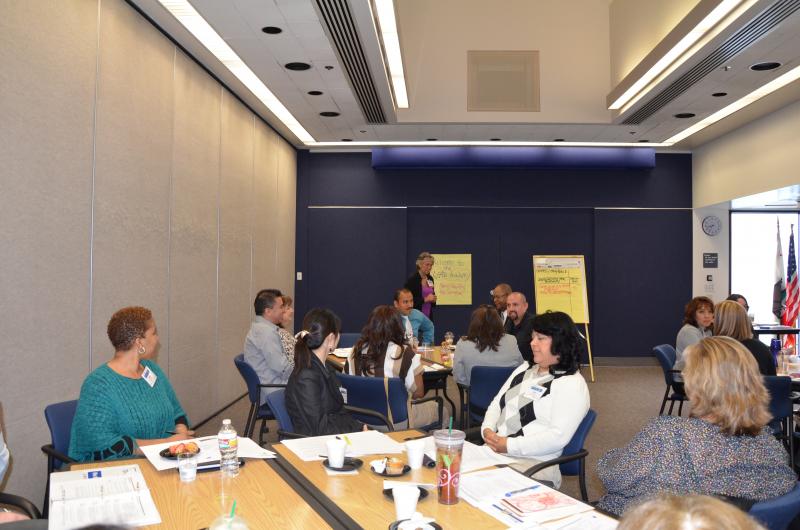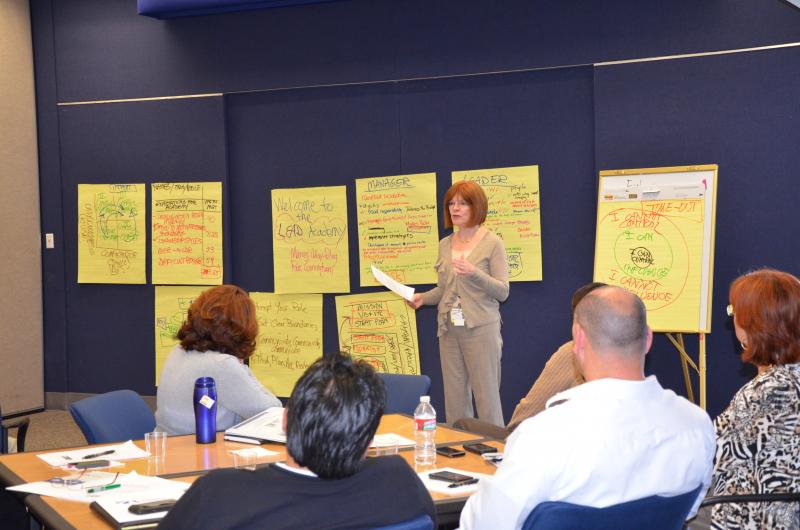LEAD Academy
Leadership training for new managers
LEAD Academy is an intensive six-session, 12-module training experience using tools and experiential learning to empower recently hired, newly appointed or previously untrained health care leaders to better understand and use their strengths. Designed for health care supervisors and managers, LEAD is built on the underlying principle that effective leadership requires productive relationships to support excellence in patient care, sustainable business objectives and a safe patient environment.
Make An Impact
LEAD Academy is an intensive six-day, 12-module training experience using innovative tools and experiential learning to empower recently hired, newly appointed or previously untrained health care leaders to better understand and use their strengths. Designed for health care supervisors and managers, LEAD is built on the underlying principle that effective leadership requires productive relationships to support excellence in patient care, sustainable business objectives and a safe patient environment.
LEAD Academy sessions provide a safe environment to practice newly learned skills and align work goals and actions to support the broader vision of the organization. Engaging activities guide participants through the process of understanding differing leadership styles and overcoming the distinct challenges of being a leader. Specific program focus areas include:
- Self-development
- Supporting the development of others
- Managing and developing a successful organization
The program also features local health care executives who will present practical insights on being a leader in the ever-changing and increasingly competitive health care industry.
Academy Objectives
At the conclusion of the LEAD Academy, participating health care managers will be able to:
- Improve the performance of the people and groups that report to them
- Enhance their contribution to the achievement of facility and System objectives
- Increase their own self management skills during everyday and stressful situations
Our Curriculum
Classroom modules, taught by world-class facilitators, culminate with a certificate of completion. At the conclusion of each module, managers will be able to demonstrate the following points.
Session I
From Peer, to Manager, to Leader
• Differentiate between leadership and management/supervision, and use the approach best suited to the situation
• Explain what successful leadership, management/supervision looks and sounds like
• Apply four key leadership principles and practices that support success for supervisors and managers
• Describe how job responsibilities at each level of the organization align to help the organization achieve its goals and objectives
Leading People Differently
• Approach tasks and relationships differently with different people (using the DISC tool)
• Acknowledge how their own behavior is influenced by preferences
• Adapt their style to develop improved relationships with employees who have a different “style”
• Influence people with whom they have been challenged in the past
Session 2
Leadership Communication Best Practices
• Successfully use the three communication cues that impact understanding
• Use interpretive listening to help employees and colleagues understand the reason for communication
• Deliver messages in a way that achieves the intent of the communication
• Apply the most effective communication tools with different people in different situations
Coaching Employees to Higher Performance
• Identify coaching goals based on the needs of the employee and the organization
• Adapt their coaching approach based on the person in the situation and the desired outcome
• Plan and facilitate coaching meetings for improved or higher performance
• Increase employee performance as a result of focused feedback
Session 3
Leading Others Through Change
• Predict their own natural responses to day-to-day and event-based change
• Determine their employees and others predictable responses to day-to-day and event-based change
• Use their leadership and communication skills to help their employees and others work through issues arising from change
• Keep and adapt gentle pressure towards successful change
Managing Performance
• Create measurable performance goals with each employee that reinforce the organization’s goals
• Observe employee performance objectively
• Reduce rater bias in evaluating performance and providing feedback
• Stay in their “Adult” when giving performance feedback
Session 4
Building and Leading Effective Teams
• Clarify the team’s purpose and ensure a WIIFM for all team members
• Define the roles and responsibilities required from team members
• Identify and build on each team member’s knowledge, skill, experience, and interpersonal style
• Apply process tools and techniques to guide pro-active team engagement
• Measure, track, and report team performance for continuous team development
Planning and Running Effective Team Meetings
• Use different processes for different meetings
• Plan and open outcome-oriented meetings
• Manage meeting processes and behaviors
• Close meetings to enhance understanding, agreement and action
• Follow-up on meetings to provide maximum benefit
Session 5
Resolving Interpersonal Conflict
• Identify common sources of conflict
• Choose between five options for responding to conflict at the source based on the risks and benefits of each
• Adjust their preferred style for responding to conflict to achieve a productive outcome
• Facilitate and engage in a conversation focused on successful conflict resolution
Organizing your Time, Work and Priorities
• Identify and overcome personal time wasters, procrastination, or indecision
• Create or enhance a personal productivity strategy based on strengths and limitations
• Prioritize requests, requirements and deadlines
• Organize and manage their workspace, phone, and e-mail
Session 6
Why and How of Organizational Policies
• Explain the impact of the dynamics that drive organizational behavior in healthcare
• Create policies that establish or reinforce the desired organizational culture
• Interpret and communicate organizational policies and ensure understanding and buy-in to increase compliance
• Administer and reinforce organizational policies
Business and Finance for Today’s Health Care Leader
• Read a financial report and know why it matters
• Explain healthcare reimbursement; how hospitals get paid, third party payers and why they matter
• Describe the relationship between a department finances and the hospital’s finance
• Explain organizational performance measures and how to use them
Faculty
Working with HASC, IRI Consultants designed the LEAD Academy based on its 30-year track record of helping health care organizations be more effective and successful. This is based on IRI Consultants’ strong affiliations with the American Hospital Association (AHA), the American Society for Healthcare Human Resources Administration (ASHHRA), The Healthcare Roundtable, and state and regional hospital associations like HASC.
Marcey Uday-Riley, MSW, CPT, has been a human performance and organization development consultant for more than 25 years. For many years, Marcey was a clinical behaviorist and manager in a large, urban teaching hospital. She now helps organizations across multiple industries achieve business objectives as a consultant and trainer. She has provided executive, manager and leader training for such organizations as Metropolitan Chicago HealthCare System, Kaleida Health, Lake Regional Health System and Oakwood Health System.
Pamela Cunningham is a Six Sigma Black Belt skilled at blending the technical with the human side of high performance. A highly regarded trainer, Pam conducted leadership training for clinical and non-clinical managers for private- and public-sector health care organizations including Marquette General Health System, BCBS Michigan, Metro Healthcare and CIGNA. She also has advised hospital executives on how to quickly and effectively resolve various organizational issues in such organizations as Lutheran, St. Vincent and Baptist Hospitals.
Registration
Registration Information
If you are interest in pursuing the certificate in health care leadership please complete the registration form and return it to Karen Ochoa.
Pre-Registration
Pre-registration in required. Registrations are processed on a first-come, first-served basis.
Withdrawal Policy
All cancellations must be requested in writing and confirmed by HASC at least two weeks prior to class start date and will be subject to a $50 processing fee per cancelled session.
Sponsorship Opportunities
For more information about sponsoring the LEAD Academy, please contact Karen Ochoa at (213) 538-0765 or kochoa@hasc.org.
Meal Sponsor ($1,400) – three opportunities
- On-site catered lunch for 30 program attendees
- 2-minute personal welcome prior to meal
- Signage on buffet at sponsored program day
- Distribution of marketing materials at sponsored program
- Recognition in one issue of HASC News Briefs e-newsletter (readership of 1,450)
- Logo recognition on the LEAD Academy webpage
Event Photos





1812 Verdugo Boulevard
Glendale, CA 91208




